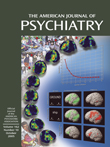Face Recognition Memory Deficits and Visual Object Memory Performance in Patients With Schizophrenia and Their Relatives
Abstract
OBJECTIVE: Face recognition memory deficits in schizophrenia are attributed to frontotemporal dysfunction. Biological relatives of patients have similar deficits, suggesting genetic susceptibility. Because the impairment may reflect generalized object memory deficits, the authors evaluated both face and visual object recognition. METHOD: The Penn Face Memory Test and Visual Object Learning Test were given to 102 patients with schizophrenia, 60 of their biological relatives, and 135 healthy comparison subjects. RESULTS: Significant immediate and delayed face recognition deficits were observed in patients and their relatives. Although patients were more impaired in visual object memory than comparison subjects, relatives were not. CONCLUSIONS: Face recognition deficits in patients with schizophrenia and their families are not secondary to generalized object memory deficits and may be an endophenotype reflecting frontotemporal impairment.



